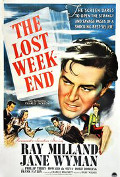
Directed by
Billy Wilder
101 minutes
Rated PG
Reviewed by
Bernard Hemingway

The Lost Weekend
This classic “social issue” film won the 1945 Best Picture Oscar over closest rivals Mildred Pierce and Spellbound, and gave Wilder a Best Director Oscar and Ray Milland, in an a-typical role, the Best Actor Oscar.The film looks at the self-destructive behaviour of the addictive personality with Milland playing an alcoholic wannabe writer Don Burnham, who goes on a frighteningly self-destructive three day binge. The final section is glib by contemporary standards but up to that stage the film successfully draws on the strengths of German Expressionist cinema in which Wilder had his roots, using dramatic lighting and striking camera angles to convey the distorted perceptions of his protagonist.
Milland gives a strong, albeit occasionally, strained performance (Paramount over-ruled Wilder on his original choice for the role, Jose Ferrer) and the film is well-written (another Oscar for Best Screenplay) by Wilder with long-time collaborator, Charles Brackett (who was also the producer), from a novel by Charles Jackson.
Although Miklós Rózsa's score is rather B grade the film deserves credit for tackling material which, sentimental resolution aside, is far from being anodyne Hollywood fare of the era. Wilder’s direction is impressive with some nice touches such as the moisture rings on the bar used to denote the passage of time, although the hospital sequence with Frank Faylen as a male nurse seems unintentionally ambivalent, oscillating between the solicitous and the sadistic. Some of this ambiguity also creeps into the relationship between Don and his girlfriend (played by Jane Wyman) who is on the one-hand solicitous and supportive and on the other is so beholden to domesticity as to drive a saint to drink.
FYI: For trivia/coincidence buffs, Oscar-winner Joan Crawford's third ex-husband, Phillip Terry, plays Burnham's brother.
Want something different?





